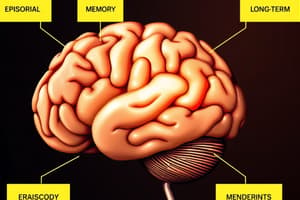Podcast
Questions and Answers
What distinguishes long-term memory from short-term memory?
What distinguishes long-term memory from short-term memory?
- LTM has a limited storage capacity.
- LTM is less active than short-term memory.
- LTM retains information for a long period. (correct)
- LTM only stores sensory information.
Which area of the brain is primarily associated with the consolidation of memories?
Which area of the brain is primarily associated with the consolidation of memories?
- Hippocampus (correct)
- Amygdala
- Frontal cortex
- Cerebellum
What is an example of episodic memory?
What is an example of episodic memory?
- Recalling your first day at school (correct)
- Identifying a historical fact
- Knowing that London is the capital of England
- Recognizing a face from a photo
What type of memory is primarily responsible for knowing how to perform tasks without conscious thought?
What type of memory is primarily responsible for knowing how to perform tasks without conscious thought?
How does long-term memory revise stored knowledge?
How does long-term memory revise stored knowledge?
What differentiates autobiographical memory from other types of memory?
What differentiates autobiographical memory from other types of memory?
Which condition is most likely to lead to the formation of a flashbulb memory?
Which condition is most likely to lead to the formation of a flashbulb memory?
What is an example of semantic memory?
What is an example of semantic memory?
How does recognition memory differ from recall memory?
How does recognition memory differ from recall memory?
Which factor has been found to affect memory for distant events?
Which factor has been found to affect memory for distant events?
What happens to the hippocampal cells during sleep after learning?
What happens to the hippocampal cells during sleep after learning?
In memory tasks, what type of knowledge does recall typically require?
In memory tasks, what type of knowledge does recall typically require?
Which characteristic is NOT associated with procedural memory?
Which characteristic is NOT associated with procedural memory?
What role does self-esteem play in autobiographical memory?
What role does self-esteem play in autobiographical memory?
Which statement regarding explicit memory is correct?
Which statement regarding explicit memory is correct?
Which factor can influence the effectiveness of learning in memory tasks?
Which factor can influence the effectiveness of learning in memory tasks?
Which memory technique involves linking items to distinctive landmarks in a familiar environment?
Which memory technique involves linking items to distinctive landmarks in a familiar environment?
What is the primary purpose of mnemonic devices?
What is the primary purpose of mnemonic devices?
In the Peg Word System, what is used to help remember new items?
In the Peg Word System, what is used to help remember new items?
The Key Word System primarily helps with learning what type of information?
The Key Word System primarily helps with learning what type of information?
Which mnemonic technique is best suited for remembering a list of items in a specific order?
Which mnemonic technique is best suited for remembering a list of items in a specific order?
Implicit memory primarily refers to what type of knowledge?
Implicit memory primarily refers to what type of knowledge?
Which mnemonic device incorporates creating a sentence or phrase to aid memory?
Which mnemonic device incorporates creating a sentence or phrase to aid memory?
Which of the following statements about the Method of Loci is incorrect?
Which of the following statements about the Method of Loci is incorrect?
What type of interference occurs when new information hinders the recall of previously learned material?
What type of interference occurs when new information hinders the recall of previously learned material?
What primarily causes forgetting in short-term memory?
What primarily causes forgetting in short-term memory?
Which statement correctly describes proactive interference?
Which statement correctly describes proactive interference?
What is essential for transferring information to long-term memory?
What is essential for transferring information to long-term memory?
Which scenario best exemplifies the concept of retroactive interference?
Which scenario best exemplifies the concept of retroactive interference?
What is the role of sensory memory in remembering information?
What is the role of sensory memory in remembering information?
How does ignoring multiple stimuli while driving affect memory?
How does ignoring multiple stimuli while driving affect memory?
Which factor is most responsible for forgetting information in long-term memory?
Which factor is most responsible for forgetting information in long-term memory?
Which type of processing focuses on the meaning of words?
Which type of processing focuses on the meaning of words?
What does the Levels of Processing theory suggest about memory retention?
What does the Levels of Processing theory suggest about memory retention?
What determines the type of analyses individuals apply according to Levels of Processing?
What determines the type of analyses individuals apply according to Levels of Processing?
Which of the following is true regarding shallow processing?
Which of the following is true regarding shallow processing?
Which aspect of information processing is NOT mentioned in the Levels of Processing approach?
Which aspect of information processing is NOT mentioned in the Levels of Processing approach?
What distinguishes maintenance rehearsal from elaborative rehearsal?
What distinguishes maintenance rehearsal from elaborative rehearsal?
Which processing strategy is likely to trigger past experiences and associations?
Which processing strategy is likely to trigger past experiences and associations?
Which of the following statements best describes the self-reference effect?
Which of the following statements best describes the self-reference effect?
What criticism is commonly directed at traditional information processing models like those proposed by Atkinson & Shiffrin?
What criticism is commonly directed at traditional information processing models like those proposed by Atkinson & Shiffrin?
Which process is primarily involved in moving information from short-term memory to long-term memory?
Which process is primarily involved in moving information from short-term memory to long-term memory?
Which of the following best describes episodic memory as defined by Tulving?
Which of the following best describes episodic memory as defined by Tulving?
What is a potential outcome of engaging in cognitive analysis of information?
What is a potential outcome of engaging in cognitive analysis of information?
In the context of memory processing, what does the term 'boxes in the head theory' refer to?
In the context of memory processing, what does the term 'boxes in the head theory' refer to?
Flashcards
Long-Term Memory (LTM)
Long-Term Memory (LTM)
A memory system that stores information for extended periods, seemingly limitless, holding personal memories, general knowledge, and beliefs.
LTM's role in forging links
LTM's role in forging links
LTM connects our past to present experiences. It helps us understand the context of our memories.
Procedural Memory
Procedural Memory
Part of LTM responsible for knowing how to perform actions (motor skills). It's automatic and unconscious.
Semantic Memory
Semantic Memory
Signup and view all the flashcards
Hippocampus and Memory
Hippocampus and Memory
Signup and view all the flashcards
Memory Encoding's role
Memory Encoding's role
Signup and view all the flashcards
Memory Consolidation
Memory Consolidation
Signup and view all the flashcards
Frontal Cortex & Memory
Frontal Cortex & Memory
Signup and view all the flashcards
Implicit Memory
Implicit Memory
Signup and view all the flashcards
Method of Loci
Method of Loci
Signup and view all the flashcards
Peg Word System
Peg Word System
Signup and view all the flashcards
Mnemonic Devices
Mnemonic Devices
Signup and view all the flashcards
Key Word System
Key Word System
Signup and view all the flashcards
Mnemonic Device Example
Mnemonic Device Example
Signup and view all the flashcards
Remembering a Sequence
Remembering a Sequence
Signup and view all the flashcards
Learning Foreign Words
Learning Foreign Words
Signup and view all the flashcards
Episodic Memory
Episodic Memory
Signup and view all the flashcards
Autobiographical Memory
Autobiographical Memory
Signup and view all the flashcards
Flashbulb Memory
Flashbulb Memory
Signup and view all the flashcards
Recall Memory
Recall Memory
Signup and view all the flashcards
Recognition Memory
Recognition Memory
Signup and view all the flashcards
Recall vs. Recognition
Recall vs. Recognition
Signup and view all the flashcards
Retroactive Interference
Retroactive Interference
Signup and view all the flashcards
Proactive Interference
Proactive Interference
Signup and view all the flashcards
Sensory Register
Sensory Register
Signup and view all the flashcards
Short-Term Memory (STM)
Short-Term Memory (STM)
Signup and view all the flashcards
Forgetting (interference)
Forgetting (interference)
Signup and view all the flashcards
Memory transfer to STM
Memory transfer to STM
Signup and view all the flashcards
Memory transfer to LTM
Memory transfer to LTM
Signup and view all the flashcards
Levels of Processing Theory
Levels of Processing Theory
Signup and view all the flashcards
Structural Processing
Structural Processing
Signup and view all the flashcards
Phonetic Processing
Phonetic Processing
Signup and view all the flashcards
Semantic Processing
Semantic Processing
Signup and view all the flashcards
Deep Processing
Deep Processing
Signup and view all the flashcards
Shallow Processing
Shallow Processing
Signup and view all the flashcards
Maintenance Rehearsal
Maintenance Rehearsal
Signup and view all the flashcards
Elaborative Rehearsal
Elaborative Rehearsal
Signup and view all the flashcards
Self-Reference Effect
Self-Reference Effect
Signup and view all the flashcards
Information Processing
Information Processing
Signup and view all the flashcards
Study Notes
Long-Term Memory
- Long-term memory stores information over long periods.
- It has a seemingly unlimited capacity able to store information almost indefinitely.
- It helps forge connections between past and present experiences.
- It holds vast amounts of diverse information, including personal memories, general knowledge, and beliefs.
- LTM is dynamic, constantly updating and adapting with new information.
Types of Long-Term Memory
- Explicit/Declarative Memory: Involves conscious recall.
- Semantic Memory: Stores general knowledge (e.g., meanings of words, facts).
- Episodic Memory: Stores personal experiences and events.
- Implicit/Nondeclarative Memory: Does not involve conscious recall.
- Procedural Memory: Stores learned actions and skills (e.g., riding a bicycle).
Autobiographical Memories
- Autobiographical memory is about an individual's history.
- It's constructive, not an exact record. We reconstruct events.
- Self-esteem plays a role. Those with positive self-esteem tend to recall more positive events.
Flashbulb Memories
- Vivid, powerful memories of significant events (e.g., 9/11, a shocking news story).
- Linked to importance and emotional strength of the event itself.
Measuring Memory
- Recall: Producing information from memory without cues.
- Recognition: Identifying information from previously seen or heard stimuli.
- Research shows recognition is usually better than recall.
Implicit vs. Explicit Memory
- Explicit memory requires conscious recall.
- Implicit memory doesn't require conscious awareness (e.g., procedural memory).
Mnemonic Devices
- Strategies to improve memory.
- Techniques for encoding and retrieving information.
- Examples include method of loci, peg word system, keyword system, organizational schemes, and acrostics.
Mechanisms of Forgetting
- Primacy Effect: Early information is better remembered due to rehearsal.
- Recency Effect: Recent information is better remembered.
- Decay: Information fades over time due to disuse or lack of activation.
- Interference: Forgetting due to prior or subsequent learning disrupting retrieval.
- Retroactive interference: New learning disrupts recall of old.
- Proactive interference: Old knowledge interferes with new.
Memory Models
- Level of Processing: Deeper processing leads to better memory retention.
- Self-Reference Effect: Processing information in relation to oneself improves memory.
- The deeper we process information, the better we remember it.
Studying That Suits You
Use AI to generate personalized quizzes and flashcards to suit your learning preferences.




